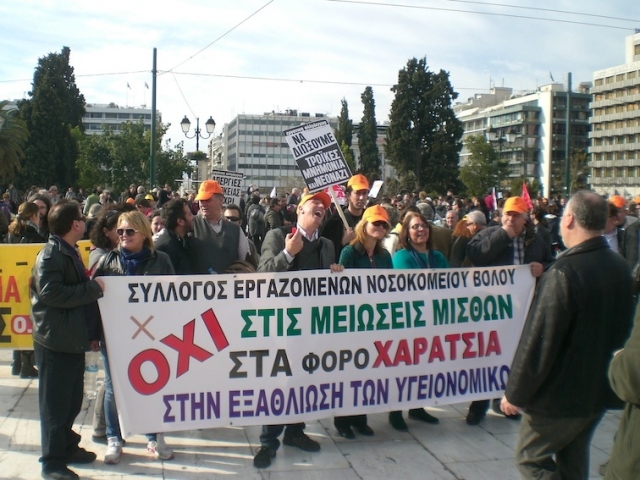Victoria Mindova
A little more than five hundred people came out in the streets of Athens on Thursday after the union of private sector employees (GSEE) announced a 24-hour strike. The main protesters were public health workers. They gathered in front of the relevant ministry to express their dissatisfaction with the budget cuts, the lack of staff and the serious shortage of medicines. The union of public sector workers (ADEDY) which announced a four-hour strike after noon supported the protests as well.
The trade union of the railway company OSE and representatives of the public transport workers had also announced a meeting in Omonia Square in the morning of Thursday 31 January, which was attended by less than 150 people. "The underground workers do not have the right to take part in the protest, because they are under civil mobilization. Their absence from work on the day of the 24-hour strike can become the cause for their dismissal," thus the chairman of the union of underground workers Antonis Stamatopoulos explained the low participation in the protest to GRReporter. Only representatives of the leadership of the underground trade union and underground workers, who had a day off on the day of the strike, attended the protest. They were wearing black shirts with a "mobilized" sign on them and leading the small procession of public transport workers.
Both meetings merged shortly after one o'clock in the afternoon in a protest procession to the parliament building on Syntagma Square. Unlike previous protests, this one was marked by the extremely low activity of the workers. Despite the small number of participants, main thoroughfares in the city centre, which were part of the protesters’ route, had been closed.
Representatives of various health institutions from the country had come to Athens to express at the protest of doctors and hospital staff their dissatisfaction with the policy pursued.

"We work extra shifts, which are not paid. Doctors’ duties have not been paid for four months already and overtime pay has been delayed for six months," said a hospital worker from Volos, who had come to Athens to join the protest. He explained that Volos could end up without ear, nose and throat and urological clinics from next month onwards because the hospital funding was not enough. "If one of our fellow citizens needs such medical examinations, he or she will have to travel 65 kilometres to Larissa to undergo a medical examination or to see a private doctor and pay for the examination and the tests," said the hospital worker.
A nurse from Volos again said that there was a serious problem with the personnel responding to emergency calls. "We have one or two drivers for every six ambulances," she said in a conversation with GRReporter. After the beginning of the crisis, the state created an extraordinary retirement programme for public sector workers. "As many of our colleagues took advantage of this programme, there have remained many vacancies that are not yet occupied. The shortage of staff hinders our work and harasses the patients. The budgets of hospitals and clinics have been cut by about 40% and the management is doing nothing to facilitate our work," said the nurse.
The protest lasted about an hour and a half and then broke up. The strikers gave a list of demands to representatives of the parliamentary opposition SYRIZA to raise the issue in parliament without having high expectations for any change in the situation.
In Piraeus, port workers announced a 48-hour strike too. Ships and ferries departing from there will not operate until Saturday, which is expected to create shipping problems in the country. At present, the public support for nationwide protests has weakened. A Greek journalist with long experience told GRReporter that people have realized that the state has no money and are reluctantly accepting the cuts imposed. In addition, the public has lost faith in professional trade unionism, which has been cultivated in recent decades and now, it wants real solutions to today's problems of unemployment and recession.